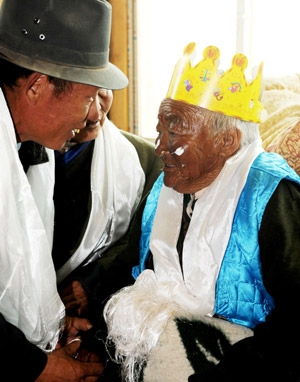| Tibet's oldest woman, Arme Tsering, celebrated her 118th birthday Monday at home in the northeastern suburbs of Lhasa.
In her best clothing -- a blue vest, green woolen sweater and a brand new Tibetan costume -- Tsering sat quietly under an umbrella in her courtyard to enjoy the sunshine as guests, mainly county and village officials and a few reporters, poured in. Everyone offered a hada, a white, Tibetan-style scarf, and wished her good health.
 |
|
Tibet's oldest woman, Arme Tsering(R), celebrates her 118th birthday at home in the northeastern suburbs of Lhasa, March 16, 2009. (Xinhua/Soinam Norbu) |
One by one, the old woman quietly counted the beads in her left hand, while the crowd curiously watched her and snapped photos.
Tsering was born on March 16, 1891, in a small village in Ngari Prefecture. She moved with her husband to Lhunzhub County, about 40 km northeast of Lhasa, in the 1930s.
"Happy birthday to you ..." everybody sang in Mandarin and Tibetan as the birthday cake was shared. Three Tibetan women, all village officials, sang a Tibetan song to congratulate her. Said one: "Of all the people I know, no one is as lucky as you ..."
Tsering couldn't see or hear them: she's lost her hearing and eyesight. She sat motionless when her daughter fed her birthday cake, but smiled when her great-granddaughter, 9-year-old Medo Drolma, naughtily daubed cream on the old woman's cheeks and nose.
Tsering can't talk much either, anymore, except for the occasional articulation of a daughter or grandchild's name. There is hardly any expression on her tanned face, except when a fit of coughing makes her grimace in pain.
"Mom's health is deteriorating every day," said her daughter, Yangjen, 70. "She has high blood pressure, asthma and chronic bronchitis. Her memory is fading and she rarely talks."
Until three years ago, Tsering was still able to walk around on her stick or even go shepherding. Today, she spends most time sitting or lying. Wherever she goes, her granddaughter Shaboi carries her on her back.
When asked about Tsering's secret of longevity, Yangjen said it was just tea, minced beef and zanba, a Tibetan food made of fried barley flour. "Plus a hot temper, maybe," she said. "My mother was very outspoken and straightforward in her younger days. Sometimes she couldn't control her temper."
Yangjen is the second of three children and the only one to survive to old age. She doesn't remember much about her father, who died of illness when she was about 8.
"My father used to travel with a horse caravan that carried tea, salt and fabric to different parts of Tibet," said Yangjen.
After her father died, the family could only make a living by begging or working as shepherds or domestic servants for a rich family. Yangjen's elder sister and younger brother both died of illness in those years.
"My mother is not able to talk any more, but she knows everything by heart," said Yangjen. "We are both happy with today's life, without having to worry about food, clothing or shelter. Just think about it, if we were still begging and homeless, how could my mother have survived to such an age?"
Yangjen's family is not rich even by local standards, with only 1,000 yuan (147 U.S. dollars) in per capita farming income a year. The extended family has 13 people, but her three sons live separately. Her daughter Shaboi, 38, is the only breadwinner and caregiver at home.
Shaboi remains single. She plants barley, wheat and potatoes on about one hectare of land.
Tsering receives 800 yuan a year from the regional government, a subsidy for those aged above 100.
As the centenarian became famous, many people began to drop by with gifts, largely cereal, cooking oil and yak butter, which have eased the family's financial burden, said Pasang Dekyi.
The family built a new two-story house last year, with 12,000 yuan in government subsidies and 20,000 yuan from a Lhasa hotel.
Tibet has 79 centenarians, according to the regional civil affairs bureau.
"We have the feeling that Tsering is among the oldest people in the world," said village official Chen Jianlan. "But she cannot apply for a listing in the Guinness World Record because the procedure is too complicated."
According to Chen, Guinness needs to confirm a person's age through a series of lab tests including DNA. "There's no such testing center in Lhasa, and at her age, it's dangerous to travel too far," Chen said.
(Xinhua News Agency March 16, 2009) | 